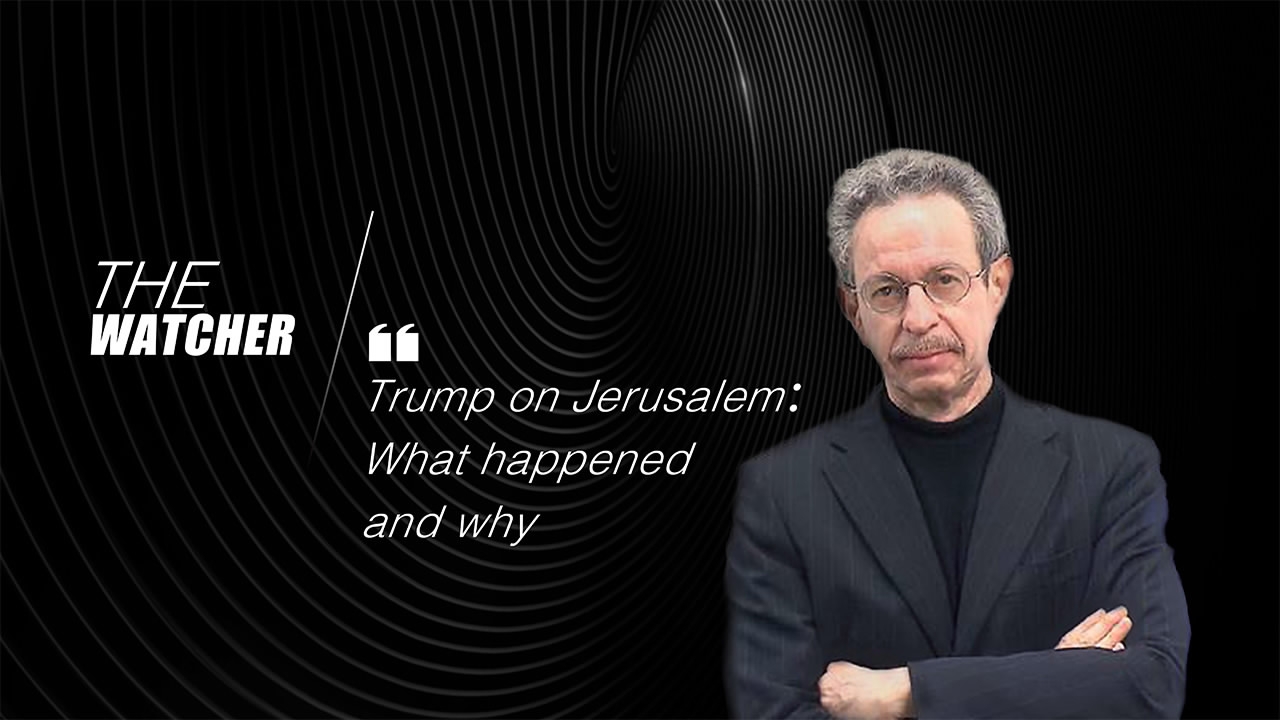
Opinions
14:27, 19-Dec-2017
Trump on Jerusalem: What happened and why
Robert L. Kuhn

I’m Robert Lawrence Kuhn and here’s what I’m watching – Jerusalem.
There is no location on earth more holy to more people than Jerusalem. There is no location on Earth more contentious and more contested than Jerusalem. President Donald Trump’s recognition that Jerusalem is the capital of Israel has ignited a firestorm of rage across the Middle East; his decision is criticized worldwide by every mainstream news organization and political commentator, and he was even opposed by many on his own inner team.
I have two questions:
First: What did Trump actually say?
“I have determined that it is time to officially recognize Jerusalem as the capital of Israel,” Trump said.
But Trump stressed that he was not stipulating how much of Jerusalem should be considered Israel’s capital. Palestinians see East Jerusalem as the capital of their own future state, and Trump did not rule out some kind of future division of the city.
“We are not taking a position of any final status issues, including the specific boundaries of the Israeli sovereignty in Jerusalem, or the resolution of contested borders. Those questions are up to the parties involved,” the president said.
Yet, the first half of his statement, especially when read in isolation, increases Israeli security concerns in Jerusalem and the West Bank, and causes the US State Department to tighten security for American diplomats working overseas.
Second question: What was Trump’s motivation for defying world opinion?
Some say he is out to distract from the Russian investigation or various political troubles. But Trump is a fighter, not a distractor.
Trump is appealing to his base, especially Christian evangelicals who are fervent supporters of Israel and revere Jerusalem. He also fulfills a campaign promise. “While previous presidents have made this a major campaign promise, they failed to deliver,” Trump said. “Today, I am delivering.” Trump being Trump, he is emboldened, not intimidated, by warnings or threats. (This reflex is often unwise.)
Another reason for Trump’s risky decision may be what few would dare say: a chance, a small chance, that, over time, it can work. Certainly, there are instant negatives, as Muslims globally voice their fury. But after almost seven decades since the founding of Israel, as Trump said, “we are no closer to a lasting peace agreement…. It would be folly to assume that repeating the exact same formula would now produce a different or better result.”
The likely short-term includes weeks of protests with sporadic violence, new recruiting tools for terrorist groups, and a hiatus in any talks of peace. The anger on the Arab street is real but Arab state leaders have no incentive to fan the flames; the Middle East has larger problems. Mid-term, a likely return to vagaries of the prior status quo. But Trump is mercurial and he would love to broker a deal. We’ve not seen the last of his disruptive interventions.
China opposes Trump’s declaration as not conducive to peace. Given President Xi Jinping’s vision of global governance and mutual development, China seeks stability, which is essential for development. China’s Belt and Road Initiative features investments in the Middle East, and conflicts, protests, violence are destabilizing, thwarting development.
China is friends with both sides. It has long supported the Palestinian Cause and advocated the two-state solution; and it has a Comprehensive Innovative Partnership with Israel and booming trade, especially in high tech.
The road to Middle East peace, if it arrives at all, is long and twisted. China must be watching, and, like it or not, increasingly engaged. I’m also watching. I’m Robert Lawrence Kuhn.
(Dr. Robert Lawrence Kuhn is a CGTN anchor, a public intellectual, international corporate strategist and investment banker)

SITEMAP
Copyright © 2018 CGTN. Beijing ICP prepared NO.16065310-3
Copyright © 2018 CGTN. Beijing ICP prepared NO.16065310-3